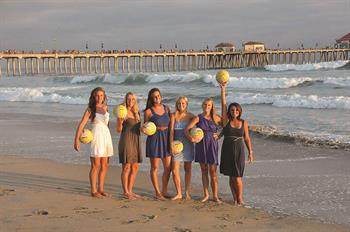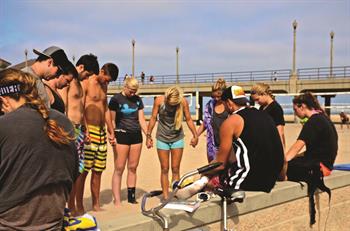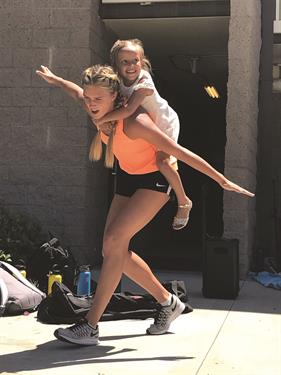It wasn’t entirely unusual for Sierra Crook’s phone to light up with a number from Southern California.
For several years, FCA Volleyball (FCAV) had, in one way or another, invited Crook into its world. But this particular call was shocking. The familiar voice of friend and mentor Meghan Locklair was on the other end, offering her a full-time job with FCA Volleyball.
Even though Crook had been integrally involved with and incredibly impacted by FCA Volleyball, she was just a few months away from getting her environmental studies degree at Adelphi (New York) University. “I’m so honored,” Crook remembers saying, “but I’m not your girl.”
Her experience with FCA Volleyball—a pathway of discipleship laid out long before
Crook could see it for herself— said otherwise.

Ephesians 4:12: We equip coaches and athletes to grow in Christ through God’s Word
She had spent two summers entrenched in the FCAV intern program, learning to follow and grow as a leader. Crook embraced the rhythms of living in ultra-close community with other college volleyball players.
She transformed as she learned to play with, not just for, God and discovered how He is inextricably interwoven in relationships and sport.
She believed in how FCAV did ministry and, more importantly, why. Still, she wasn’t immediately convinced of a calling to join FCA full-time staff and vocationally be a disciple who disciples others when Locklair called. But God began to reveal His plans. “God just started bringing up memories, saying, ‘You’ve seen college kids create Kingdom movements,’” Crook said. “[God said], ‘That’s what FCA Volleyball is going after, and I have called you to this. This is what I’m asking you to do—step out.’” Crook said yes.
ANSWERING THE CALL
A little over a decade earlier, Daniel Rich answered another call. A club volleyball player at Clemson, he visited Southern California one summer where he witnessed another ministry’s discipleship program and knew the model was for him. He soon joined FCA staff, moved to California and started FCA
Volleyball. At first, skyrocketing numbers of camps and kids involved indicated success. But during the summer of 2010, Rich was convicted bigger ministry wasn’t necessarily better—and that FCA Volleyball was falling short of creating authentic, deep discipleship. That October, Rich and 25 to 30 of his closest advisors reimagined ministry. The dream moved from adding hundreds of athletes to focusing on a few handfuls of college interns at a time—and then watching God multiply through them.
“It’s been about Him planting great leaders in places that are very desert-like,” Rich said. “College volleyball was that for me.” Locklair, who joined the FCA Volleyball team in 2011, scaled the intern program. She developed a framework for 4 to 5 former interns, known as the lead team, to guide a dozen or so rookies each summer. FCA Volleyball staff and volunteers specifically pour into the lead team.
“Everyone just let you into their lives to be taught and developed,” Crook said. FCAV’s calendar centers around a 10-week summer experience for college volleyball players. To say that every minute of those 10 weeks is accounted for is an overstatement, but only slightly. Even periods of rest are deliberate. Every piece is built on deepening discipleship—with God, in community, and eventually as outreach. Like every intern before and after her, Crook would leave Southern California with a plan titled Restore Your Campus. As she prepared to head back to Adelphi, FCAV encouraged Crook to start small.

“I have witnessed firsthand the fruits of the FCAV internship. When our Camp Huddle leaders worked with the FCAV interns to prepare for a Team Camp in South Carolina, Matthew 28:18-20 played out in front of our eyes. The Huddle leaders came in tentative and unsure, and within a few days, they were engaged, equipped and empowered to go out to younger athletes and repeat the engage, equip and empower model embraced by FCA Volleyball.”
-Kim Williams, Multi-Area Director, Midlands, South Carolina, and former Division I volleyball coach
“God kept bringing up for me that there would be one girl, one freshman who’s just going to be at my hip,” Crook said. “That one girl was Steph Milillo. I just let her in close enough that she started asking questions.”
By the next summer, Milillo was an intern with FCAV and since has started an FCA Huddle on the Long Island campus. “It was an understanding that I might join God in starting something here that I never get to see the fruit of,” Crook said, “and that’s OK.”
INVESTING IN PEOPLE
Today, FCA Volleyball continues to bear good fruit, although its original architects aren’t there to see it firsthand. Rich is the new FCA State Director for Hawaii, and Locklair left staff at the end of the 2018 intern season. Crook is the most obvious product of the ministry leadership pipeline, but FCA Volleyball’s reach has also touched the men’s and women’s national and Olympic teams. It extends into the travel clubs around the country. And it’s sweeping through the college ranks.
Abby Shelton, a 2015 intern and 2016 lead team member, is now an assistant coach at Palm Beach Atlantic University. She uses many of the practices and rhythms learned through her time with FCAV. “I learned how to ask good questions, care for people’s hearts, and seek God to figure out how to love someone closer to Him,” Shelton said.
Shelton’s story is precisely what Crook is praying to see play out more and more often in the coming years. She imagines vetting prospective interns and hearing them rattle off the FCAV relational pillars of community, relationship and mission—evidence that they “get it” before coming to Southern California.
“We just want to look over a map of the country and see these pockets of leaders investing in people who are investing in people who are investing in people on mission,” Crook said, “and rallying to meet needs and to love people well.” Just like what was done for Crook.
**

The offer to intern with FCA Volleyball comes with clear expectations:
- Life will be in community, and the positives of being a “family on mission” are coupled with the very real promise of learning to handle conflict.
- Every athlete can expect to improve physically, and they will be challenged in nearly every competitive setting to learn what it is to play volleyball “with God,” not just for Him.
- Leaders are learners, and learning happens in success and failure.
- Discipleship will be the focus throughout, but it should absolutely continue when the athletes return to their college campuses and teams.
-FCA-
Photos courtesy of FCA Volleyball